
Corporate social responsibility is a form of self-regulation of a private enterprise aimed at contributing to public objectives of a philanthropic, political, or humanitarian nature or by participating in or promoting voluntary or ethically driven activities. In earlier times, CSR was described as an internal organizational framework or a corporate policy ethics technique. Now, as time progressed and different international laws were established, different organizations exercised their influence to move it beyond individual or even industry-wide programs.


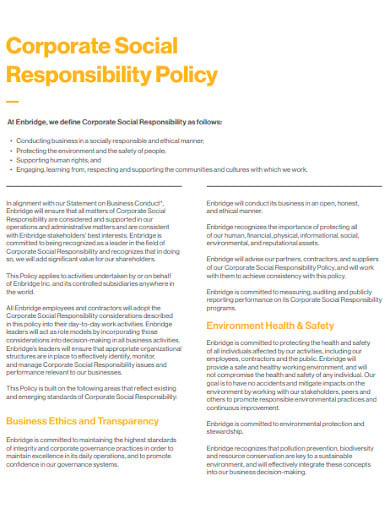
enbridge.com
File Format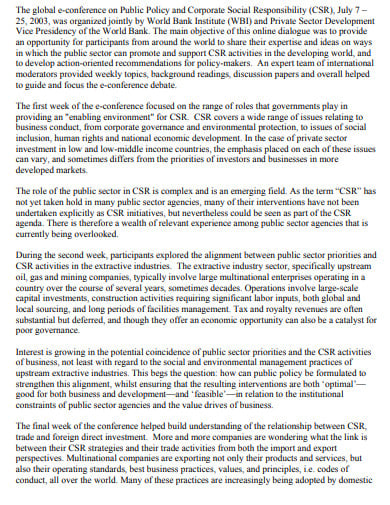
worldbank.org
File Format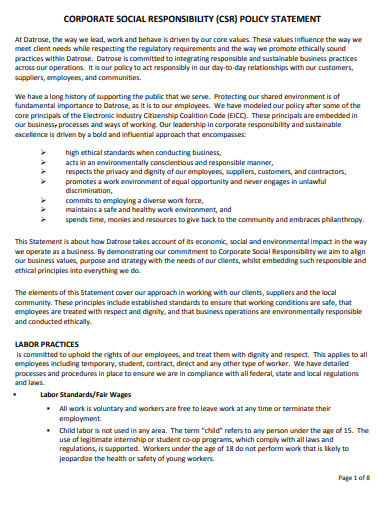
cloudfront.net
File Format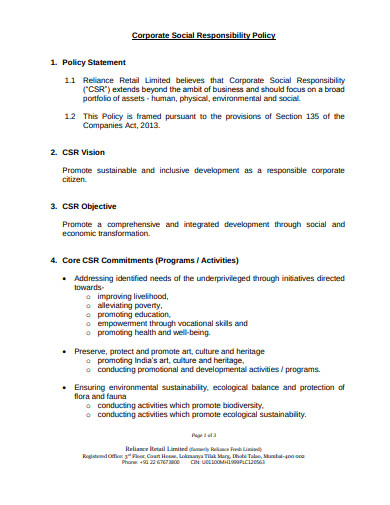
ril.com
File Format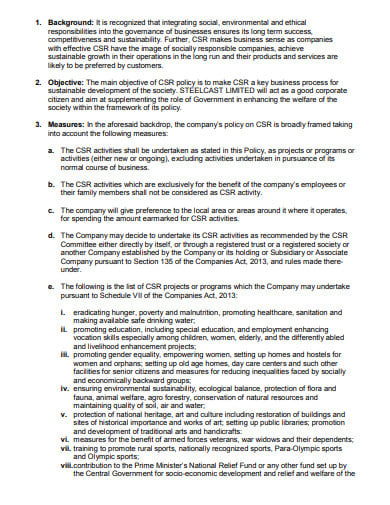
steelcast.net
File Format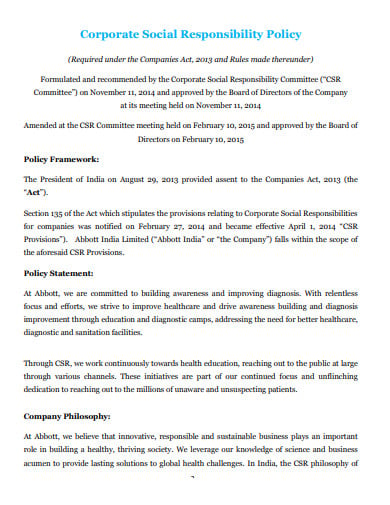
abbott.com
File Format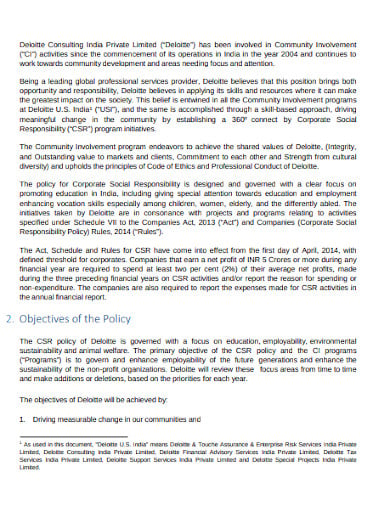
deloitte.com
File Format
axisbank.com
File Format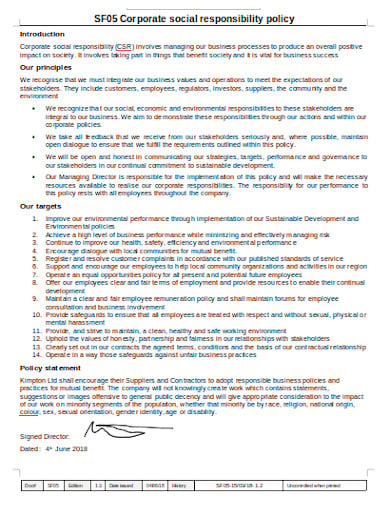
kimpton.co.uk
File Format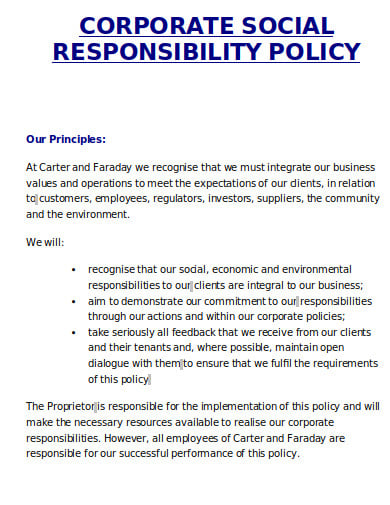
carterandfaraday.co.uk
File Format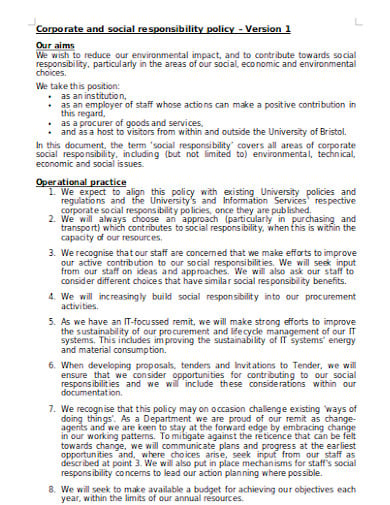
bristol.ac.uk
File FormatThe general agreement is that CSR is an investment and should be calculated just like other investments. However, others agree that CSR is a single project all by itself. In other words, businesses are doing good for the sake of doing good. CSR measurement can offer a lot of advantages even to companies that hold that view. Documenting and monitoring action plans help organizations make better decisions as to which social projects to fund, improve the effectiveness of their services, and reassure doubtful stakeholders of the importance of the efforts.
Through or participating in CSR-driven activities, clients or customers tend to be more useful, less susceptible to churning, or perhaps more willing to widen their connection with the organization. Something as basic as a lifetime value correlation among customer categories or a regression analysis could disclose surprising results for clients. Find more professional policy templates by visiting this link.
This step involves working with the finance team to discover cost-effective green savings such as low-flow toilets or reliable light bulbs. Sometimes these savings can be significant.
Many businesses are now putting greater emphasis on corporate social responsibility (CSR), but few are prioritizing the assessment of CSR activities and performance plans. Measurement will enhance CSR performance and reassure reluctant investors of its advantages and lead to additional funding. Since CSR has become an important element in corporate communications, experts believe it needs to be assessed like any other strategy.
Holding social responsibility in mind allows businesses to take responsible action and consider their company’s social and environmental impacts. Organizations can thus prevent or minimize negative community impacts of their sector. In certain cases, companies will find ways to make improvements for their programs or value chain that will bring benefits to the community where they did not earlier. View a wider selection of roles and responsibilities templates right here.
In simple terms, public value is about the impact of an organization’s contribution to society. A strong, comprehensive corporate social responsibility structure and organizational mentality can help companies achieve results of public interest by reflecting on how their programs in the community will make a difference. This could happen indirectly, where the services of a large organization encourage others to contribute to society, or directly through the actions of the organization itself, such as volunteerism and philanthropy.
Being a preferred employer generally refers to the ability of the company to attract and retain high-caliber workers. There are several different methods to approach being an employer of choice, including providing work-life balance, fair employment terms and conditions, and flexibility in the workplace. Studies have shown that a strong structure for corporate social responsibility can also allow an organization to become more attractive to potential future employees looking for workplaces with socially responsible activities, civic-mindedness, and sound ethics.
Providing workers with the opportunity to take part in the socially responsible programs of an organization will benefit from teaching staff new skills, which can be adapted to workplace safety in turn. Through engaging in activities beyond their regular work duties, employees have the opportunity to add to work and cause that they may feel strongly about or experience something completely new that can help enhance their perspectives. Organizations are promoting development and appreciation for workers by funding such programs.
A clear structure for corporate social responsibility is important for establishing and maintaining confidence between the firm and customers. It can improve relations, form alliances and promote solid working relationships with new and existing customers alike. One way to achieve this is by providing pro-bono or complementary programs where a corporation may collaborate with non-profit organizations to promote their results in terms of public benefit, where funds or resources may be minimal. Explore additional corporate social responsibility policy templates on our website, template.net, to find a variety of options that suit your needs.